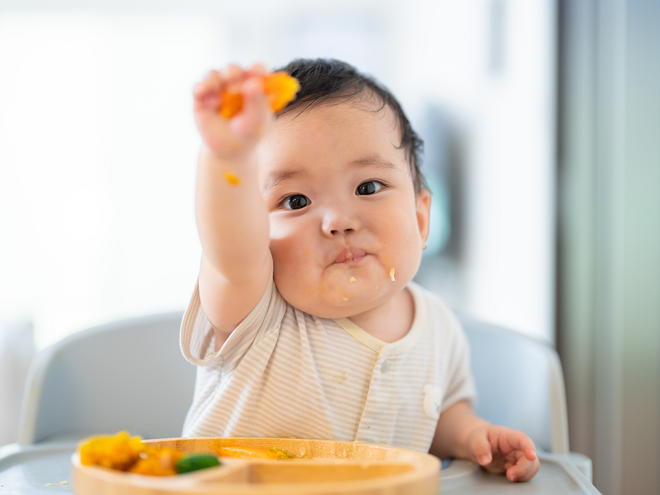
Healthy Habits for Life: Setting the Stage Before Solids
How Early Choices Shape a Lifetime of Healthy Eating
Before your baby takes their first bite, they’re already learning from the world around them. The earliest experiences—watching, smelling, reaching—help lay the groundwork for future eating habits.
By building positive mealtime routines and modeling healthy behaviors now, you’re setting the stage for a lifetime of confident, happy eating.
Understanding Baby’s Readiness for New Experiences
Certain developmental milestones show that your baby is preparing to explore the world of food:
- Sitting upright with little or no support
- Showing better hand-eye coordination (like reaching for toys)
- Growing curiosity about what’s happening at the family table
These signals mean your little one is getting ready for the exciting journey ahead!
Creating a Positive Exploration Environment
A. Establishing Positive Mealtime Routines
Even before solids begin, familiar rhythms make a difference. Keeping a consistent feeding and mealtime schedule helps babies feel safe and secure.
Reducing distractions (like screens or loud noises) creates a calm, focused environment where babies can tune into mealtime.
B. Encouraging Exploration Through Sensory Experience
Exploration is a baby’s first learning tool. Let your baby engage with different sensations at the table—holding a spoon, touching a plate, or feeling a bib’s texture.
Patience is key. It may take many exposures before something feels “safe” or familiar, and that’s completely normal.
C. Setting the Tone for Independent Eating
Supporting your baby’s independence early builds confidence later. Offer opportunities for your baby to touch, hold, or eventually self-feed when they’re ready.
Respect their natural hunger and fullness cues, even if it means some meals are shorter or slower than others.
Encouraging Healthy Development Through Responsive Parenting
Being responsive to your baby’s cues, whether they’re reaching for food, turning away, or showing excitement, strengthens your connection.
This attuned approach not only fosters emotional bonding but also supports sensory development and builds trust during mealtimes.
Long-Term Benefits of Early Sensory and Motor Skill Development
Exploring textures, reaching for objects, and practicing self-feeding movements contribute to:
- Fine motor skills (like grasping and manipulating objects)
- Sensory awareness and comfort with new experiences
- A growing sense of confidence and curiosity about the world
These small skills lay the groundwork for bigger milestones down the road.
Final Thoughts
The weaning journey is about introducing new foods, and creating experiences that are positive, patient, and full of encouragement.
Every playful moment, every curious glance at the table, helps build a strong, lifelong foundation for healthy eating habits.
By trusting the process and celebrating small victories, you’re giving your baby the tools they need to thrive—both at the table and beyond.









